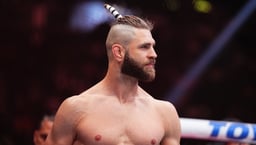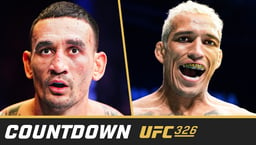
Issue 080
October 2011
Is The Ultimate Fighter still a breeding ground for UFC superstars, or has the final bell called time on its fighting future? Fighters Only investigates what the future holds for TUF
Remember when Forrest Griffin and Stephan Bonnar punched the living daylights out of one another for three rounds to determine The Ultimate Fighter? The date was April 9th 2005 and, while the judges’ scorecards may have been close and contentious, nobody argued the legitimacy of the tag applied to the victor. Griffin was The Ultimate Fighter.
It was far from a cute gimmick, either, as Griffin, buoyed by his success on the show, would indeed go on to carve a successful career for himself in the Ultimate Fighting Championship, and even win the world light heavyweight title in 2008. He used TUF to establish his personality and the UFC to establish his fighting credentials. Bonnar, too, went from strength-to-strength after 15 minutes of fame and hell with Griffin, and remains a reliable light heavyweight contender to this day.
Both fighters are admired by the fans and hierarchy alike and, given everything their first Spike-televised brawl did for the health of the company and sport, are deemed untouchable when it comes time for the axe to fall.
Their 2011 equivalents, Tony Ferguson and Ramsey Nijem, are afforded no such luxuries, however. Ferguson may have won the prize on season 13 of the groundbreaking show, but, unfortunately for him, the implications of that achievement have been diluted and contextualized in recent years. No longer does the TUF champion label represent an assumed fast track to stardom and success in the big league. Don’t believe me? Consult the formbook. TUF winners have never been further from a UFC title shot than they are in 2011.

Much of this can be put down to the rapid rate of growth – in both talent and exposure – the UFC has experienced since Griffin and Bonnar wailed away in 2005. Rather than win The Ultimate Fighter and instantly leap towards a lofty rung on the UFC ladder, aspiring mixed martial artists are now asked to win everybody’s favorite fighting-reality show and then work their way up from the bottom. For all intents and purposes, the show now acts as the job interview ahead of a tea-boy post.
Consider this: season one cast members Griffin, Diego Sanchez, Kenny Florian, Josh Kosheck and Nate Quarry have all competed for variations of a UFC world championship since leaving the TUF compound, while Joe Stevenson and Rashad Evans also followed suit from season two. However, since the conclusion of season five in 2007, no competitor from The Ultimate Fighter has competed for, let alone won, a UFC world title. Griffin, Evans and veteran Matt Serra remain the only TUF competitors to scale the heights, both in the house and when it really counts.
Perhaps more worryingly, nobody from the past eight seasons has convincingly broken free of the win-some-lose-some mousetrap that catches the big toe of most TUF also-rans. Some graduates have won fights and impressed, sure, but many more have dallied in mediocrity and then eventually been cut.
The predicament owes a lot to increased competition in the UFC, as well as the need for time and patience in a sport that extends little of either to its participants. The common assumption is that The Ultimate Fighter winner, by its very nature, should be equipped to immediately back up those claims in the UFC, when, in reality, they are merely the best fighter in a house of 16 like-minded and similarly limited and inexperienced combatants. There is nothing ultimate about their initial success. When they do eventually make the jump, backed by significant hype and expectancy, we are still watching the first baby steps of a fledgling prospect.

Even the show’s veteran winners, like former IFL champion Roy ‘Big Country’ Nelson, have no guarantee of UFC success beyond leaving the TUF house.
“The guys in the house always said I was over-qualified for season 10, and that confused me,” said Nelson. “I don’t know how you can be over-qualified for a show called The Ultimate Fighter. You can’t rule out some guys just because they’re experienced or have fought at a decent level before. The guys were complaining about it and yet they kept boasting about how they wanted to be the best in the world. You can’t have both. Even with the head start I had, I knew success in the house wouldn’t translate into a heavyweight belt.”
So, if success is no longer a given, what do winners of The Ultimate Fighter stand to gain from taking the tried and tested route? Well, in addition to a healthy contract and shortcut into the UFC, these fighters also receive the kind of television exposure and heightened profile that even many past and present UFC champions won’t have benefitted from. For better or worse, competitors on The Ultimate Fighter have the spotlight shone on their careers and lives from an early stage, and many become stars regardless of whether their fighting capabilities are up to scratch. This dynamic even makes some competitors wary of the process in the first place.
“I knew that if TUF was only about fighting, I’d have no problem getting on it,” said season nine winner Ross Pearson. “The only thing I was concerned about was the interview-based stuff, and all the bits in front of the camera. I know I don’t have the greatest television personality – I’m not the loudest or most brash person in the room – and felt that might have let me down. Ultimately, I didn’t go on to The Ultimate Fighter to become a TV star. I went on there to learn my trade, become a fighter and compete in the UFC.”

Season eight side-show Junie Browning shakes his head. Arguably the most infamous TUF contestant since bad-boy originator Chris ‘The Crippler’ Leben, Browning fiendishly tap-danced on the last nerve of just about everybody during his turbulent time on the show.
“My whole aim throughout the process was to be noticed, create controversy, stand out from the crowd and be remembered. It worked,” said Browning. “After the show there were a lot more people noticing me than before. I’d be walking round Walmart and everybody was coming up to me and asking for photos.
“I love the attention that fighting brings. I’m not going to lie, that’s an important thing for me. I want that to always be a part of my life. Fighting gives me the chance to be someone. Without it, I’m just a nobody with a beer bottle and a random skank.”
The show gave Browning a microphone and a chance. In the end, though, he made better use of the former than the latter, bowing out in the semi-finals and then losing to Cole Miller in the first round of his first and only full UFC appearance. While Leben made the most of his colorful hair and language to construct a noteworthy résumé in the UFC, Browning merely used the exposure to snare a higher class of skank and forgot all notion of improving his fighting skill.
This sense of TUF creating stars instead of fighters was then only further emphasized during season 10, as YouTube phenom Kimbo Slice, was showcased, understandably, as poster boy and marketable commodity. Blessed with the name, look and reputation to attract viewers, Kimbo was, like so many other television stars, woefully out of his depth when presented with his first fighting assignment. Big-bellied Nelson tapped Slice out in the first round of their first-round match, a result which offered two thumbs up for legitimate fighting experience.
It wasn’t Kimbo’s fault, of course. At least 35 years of age, and possessing limited structured tuition, Kimbo was, like so many younger peers, still entangled in the mixed martial arts learning process. He was asked to learn, work out and impress under the scorching glare of mixed martial arts’ brightest spotlight and, in the end, simply couldn’t withstand the heat.
Alas, The Ultimate Fighter, as a term, has become the biggest contradiction in combat sports, through no fault of the UFC or the show’s competitors. The incredible growth of this great sport has furthered and complicated the journey from TUF winner to UFC champion and most now look upon the world’s most abrasive reality show as a showcase for prospects, clowns and caricatures. Sure, it’s hit and miss, but isn’t that what fighting’s about in the first place?

TUF BEGINNINGS
‘The Quest Begins’ was the name of the first episode, and never before has a title been so apt. The Ultimate Fighter initially aired for free on Spike TV on January 17th 2005, and was used as a desperate measure to gain mainstream exposure for the underground sport of mixed martial arts. An instant ratings hit, the show appealed to fight fans as a free source of great scraps and, perhaps more importantly, its soap opera tendencies attracted casual followers in their droves.
The season-one 205lb finale match between Forrest Griffin and Stephan Bonnar is now widely regarded as the most influential fight in the sport’s short history. Moreover, the engrossing storyline and dramatic nature of the bout appealed to record numbers of viewers and announced both The Ultimate Fighter and the UFC as an emerging force on the American sporting stage.
Six-and-a-half years and 13 seasons on, The Ultimate Fighter remains a television juggernaut and is now watched by fans in over 26 countries. UFC president Dana White this year revealed plans to expand the show internationally, hinting at a series in the Philippines, as well as future editions in Brazil, Canada, Mexico, Australia and England.
...









